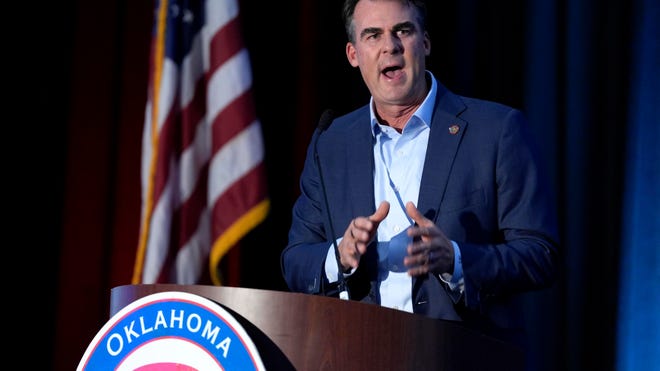Gov. Kevin Stitt says Oklahoma will have a plan to deport undocumented immigrants in the custody of state prisons as soon as President-elect Donald Trump takes office.
Saying he didn’t want the state to pay for what he described as the costs of the Biden administration’s open border policy, the Republican governor said he would seek to “expel those serving time in Oklahoma correctional facilities who are in the country illegally.”
Stitt made the announcement in a news release issued Friday, saying he was tapping Public Safety Commissioner Tim Tipton to lead the planning efforts.
“As law and order returns to the White House, Oklahoma will lead the charge with a comprehensive plan to deport those who have committed crimes in Oklahoma while in the country illegally,” Stitt said in the announcement.
“I am still committed to finding ways to pursue state-based workforce visas for those who want to pursue the American dream, but we will not tolerate criminal activity in our state,” the governor said.
Stitt’s announcement said the deportation plans could affect as many as 526 people being housed in Oklahoma Department of Corrections facilities.
The plans quickly attracted criticism and questions.
Rep. Mickey Dollens, D-Oklahoma City, acknowledged that paying to keep undocumented immigrants in state custody could be problematic, but stopped short of supporting Stitt’s plan. “It’s difficult to say I support the governor’s overall idea (and plan) based on a lack of details on how it would be implemented,” he said.
Stitt said he believes Oklahoma’s efforts could serve as a model for other states. But courts have rejected past attempts by Oklahoma officials to address federal immigration issues.
More:Ryan Walters targets immigration, plans for the end of the US DOE in memo

Oklahoma anti-immigration law HB 4156 has faced legal challenges
This year, state lawmakers passed House Bill 4156, a far-reaching measure that aimed to create a state system to regulate immigration.
The bill, which was signed into law by Stitt, makes the first offense for being undocumented in Oklahoma a misdemeanor with jail time of up to a year, or a fine of $500, or both. The second offense would be a felony. The bill would prohibit the ability of the courts or prosecutors to consider probation, delayed or community sentencing, or a future pathway to citizenship. People convicted under the law would have three days after release to leave the state.
That measure, however, was challenged in May by the U.S. Justice Department, which said the bill was an attempt to preempt federal law.
More:Immigrants fear, labor experts worry: How would Trump’s mass deportation promise impact Oklahoma?
“Oklahoma cannot disregard the U.S. Constitution and settled Supreme Court precedent,” Brian M. Boynton, head of the Justice Department’s Civil Division said. “We have brought this action to ensure that Oklahoma adheres to the Constitution and the framework adopted by Congress for regulation of immigration.”
A short time later, a federal district court judge issued a court order that prohibited the state from enforcing the bill.
The ruling sparked an appeal by Oklahoma Attorney General Gentner Drummond. Drummond said the law was “a powerful tool to counter criminal activity largely being fueled by illegal immigrants coming to our state.”
In September, Drummond asked the U.S. Tenth Circuit Court of Appeals in Denver to reverse a lower court’s preliminary injunction that put the law on hold. The measure creates a crime of “impermissible occupation” and allows law enforcement officers to arrest and jail people living in the United States without legal permission.
Be the first to know:Sign up for breaking news email alerts
“Rather, HB 4156 mirrors federal law by design,” the attorney general’s office said in its brief. “Without a valid cause of action, the United States relied on speculation about how HB 4156 would be implemented, spurious conclusions about the law’s underpinnings, and fundamental misconceptions about a state’s sovereign rights and duties in a federalist system of government.”
Prior to HB 4156, state lawmakers passed House Bill 1804, authored by then-state Rep. Randy Terrill in 2007. That bill eventually had most of its components overturned by a federal judge.
(This is a developing story.)
This post was originally published on this site be sure to check out more of their content.









